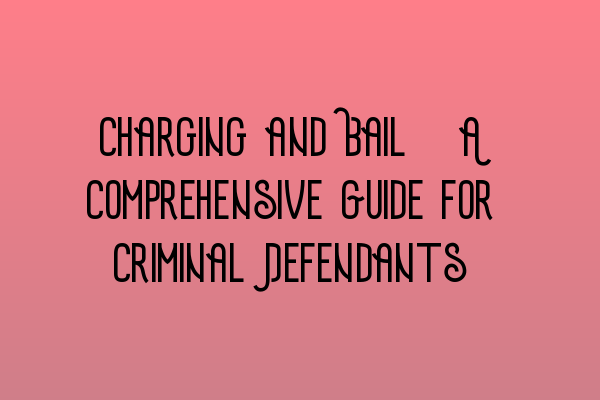Charging and Bail: A Comprehensive Guide for Criminal Defendants
Being charged with a criminal offense can be an overwhelming experience. You may find yourself uncertain about the legal process and what steps to take next. In this comprehensive guide, we will explain the concepts of charging and bail in criminal law and provide you with the information you need to navigate through these critical stages.
Understanding Charging
Charging is the formal accusation that a person has committed a specific criminal offense. It is the point at which the prosecution formally starts legal proceedings against an individual. When you are charged with a crime, it is crucial to seek legal representation immediately. A qualified criminal defense lawyer will help protect your rights, explore defense strategies, and guide you through the legal process.
Once the prosecution decides to charge you with a crime, they will prepare a charging document, usually called an information or an indictment, outlining the charges against you. This document will detail the specific criminal offenses you are accused of and will be used as the basis for the trial.
Remember, it is essential to understand the charges against you fully. If you have any doubts or concerns about the charges, consult with a criminal defense lawyer who can provide you with expert advice tailored to your situation.
The Role of Bail
After being charged with a criminal offense, the issue of bail arises. Bail refers to the temporary release of a defendant in exchange for a sum of money or other collateral to ensure their appearance at trial. The decision to grant or deny bail is determined by various factors, including the severity of the crime, the defendant’s prior criminal history, and the likelihood of flight.
It is important to note that bail is not always granted, particularly in cases involving serious offenses. In such instances, the court may decide to remand the defendant into custody until the trial. However, if bail is granted, the defendant must comply with certain conditions, such as surrendering their passport, regularly reporting to the police, or refraining from contacting certain individuals.
Seeking Legal Representation
When facing criminal charges, it is crucial to seek legal representation as soon as possible to ensure your rights are protected and you receive proper guidance throughout the legal process. A skilled criminal defense lawyer will assess the evidence against you, advise you on your options, and develop a strong defense strategy tailored to your case.
If you are unable to afford a lawyer, you may be eligible for legal aid. Legal aid provides funding to individuals who cannot afford to pay for legal representation. Speak with a criminal defense lawyer or contact your local legal aid office to determine if you qualify.
Conclusion
Charging and bail are critical stages in the criminal justice process. If you find yourself charged with a criminal offense, it is imperative to seek legal advice immediately. A skilled criminal defense lawyer will help protect your rights, explain the charges against you, and guide you through the legal complexities, giving you the best chance for a favorable outcome.
To prepare yourself further for the SQE examinations, we recommend checking out our related articles:
- SQE 1 Practice Exam Questions
- SQE 1 Practice Mocks FLK1 FLK2
- SQE 2 Preparation Courses
- SQE 1 Preparation Courses
- SRA SQE Exam Dates
